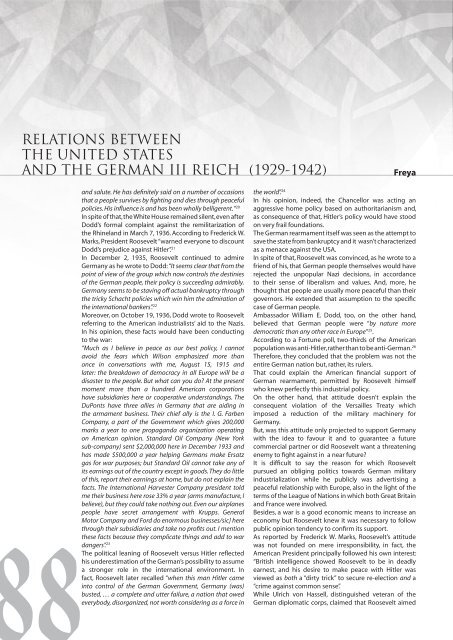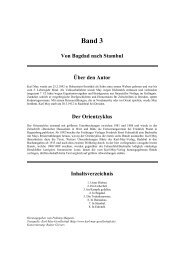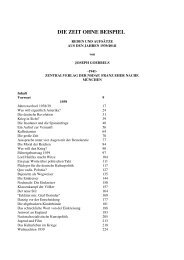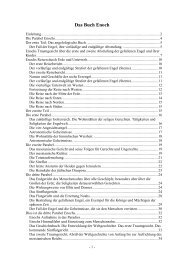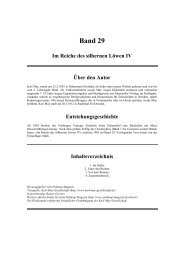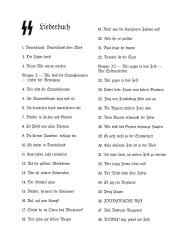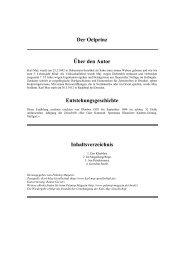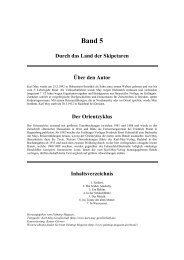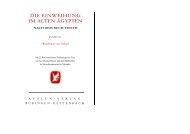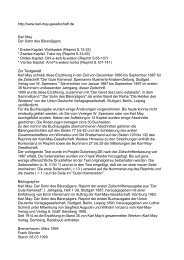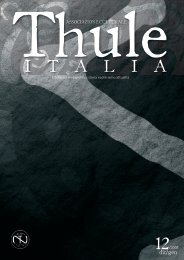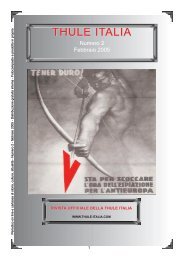Thule Italia feb2006.indd - Thule-italia.net
Thule Italia feb2006.indd - Thule-italia.net
Thule Italia feb2006.indd - Thule-italia.net
Create successful ePaper yourself
Turn your PDF publications into a flip-book with our unique Google optimized e-Paper software.
RELATIONS BETWEEN<br />
THE UNITED STATES<br />
AND THE GERMAN III REICH (1929-1942) in<br />
and salute. He has definitely said on a number of occasions<br />
that a people survives by fighting and dies through peaceful<br />
policies. His influence is and has been wholly belligerent.” 20<br />
In spite of that, the White House remained silent, even after<br />
Dodd’s formal complaint against the remilitarization of<br />
the Rhineland in March 7, 1936. According to Frederick W.<br />
Marks, President Roosevelt “warned everyone to discount<br />
Dodd’s prejudice against Hitler”. 21<br />
In December 2, 1935, Roosevelt continued to admire<br />
Germany as he wrote to Dodd: “It seems clear that from the<br />
point of view of the group which now controls the destinies<br />
of the German people, their policy is succeeding admirably.<br />
Germany seems to be staving off actual bankruptcy through<br />
the tricky Schacht policies which win him the admiration of<br />
the international bankers”. 22<br />
Moreover, on October 19, 1936, Dodd wrote to Roosevelt<br />
referring to the American industrialists’ aid to the Nazis.<br />
In his opinion, these facts would have been conducting<br />
to the war:<br />
“Much as I believe in peace as our best policy, I cannot<br />
avoid the fears which Wilson emphasized more than<br />
once in conversations with me, August 15, 1915 and<br />
later: the breakdown of democracy in all Europe will be a<br />
disaster to the people. But what can you do? At the present<br />
moment more than a hundred American corporations<br />
have subsidiaries here or cooperative understandings. The<br />
DuPonts have three allies in Germany that are aiding in<br />
the armament business. Their chief ally is the I. G. Farben<br />
Company, a part of the Government which gives 200,000<br />
marks a year to one propaganda organization operating<br />
on American opinion. Standard Oil Company (New York<br />
sub-company) sent $2,000,000 here in December 1933 and<br />
has made $500,000 a year helping Germans make Ersatz<br />
gas for war purposes; but Standard Oil cannot take any of<br />
its earnings out of the country except in goods. They do little<br />
of this, report their earnings at home, but do not explain the<br />
facts. The International Harvester Company president told<br />
me their business here rose 33% a year (arms manufacture, I<br />
believe), but they could take nothing out. Even our airplanes<br />
people have secret arrangement with Krupps. General<br />
Motor Company and Ford do enormous businesses/sic] here<br />
through their subsidiaries and take no profits out. I mention<br />
these facts because they complicate things and add to war<br />
dangers”. 23<br />
The political leaning of Roosevelt versus Hitler reflected<br />
his underestimation of the German’s possibility to assume<br />
a stronger role in the international environment. In<br />
fact, Roosevelt later recalled “when this man Hitler came<br />
into control of the German Government, Germany (was)<br />
busted, … a complete and utter failure, a nation that owed<br />
everybody, disorganized, not worth considering as a force in<br />
Freya<br />
the world”. 24<br />
In his opinion, indeed, the Chancellor was acting an<br />
aggressive home policy based on authoritarianism and,<br />
as consequence of that, Hitler’s policy would have stood<br />
on very frail foundations.<br />
The German rearmament itself was seen as the attempt to<br />
save the state from bankruptcy and it wasn’t characterized<br />
as a menace against the USA.<br />
In spite of that, Roosevelt was convinced, as he wrote to a<br />
friend of his, that German people themselves would have<br />
rejected the unpopular Nazi decisions, in accordance<br />
to their sense of liberalism and values. And, more, he<br />
thought that people are usually more peaceful than their<br />
governors. He extended that assumption to the specific<br />
case of German people.<br />
Ambassador William E. Dodd, too, on the other hand,<br />
believed that German people were “by nature more<br />
democratic than any other race in Europe” 25 .<br />
According to a Fortune poll, two-thirds of the American<br />
population was anti-Hitler, rather than to be anti-German. 26<br />
Therefore, they concluded that the problem was not the<br />
entire German nation but, rather, its rulers.<br />
That could explain the American financial support of<br />
German rearmament, permitted by Roosevelt himself<br />
who knew perfectly this industrial policy.<br />
On the other hand, that attitude doesn’t explain the<br />
consequent violation of the Versailles Treaty which<br />
imposed a reduction of the military machinery for<br />
Germany.<br />
But, was this attitude only projected to support Germany<br />
with the idea to favour it and to guarantee a future<br />
commercial partner or did Roosevelt want a threatening<br />
enemy to fight against in a near future?<br />
It is difficult to say the reason for which Roosevelt<br />
pursued an obliging politics towards German military<br />
industrialization while he publicly was advertising a<br />
peaceful relationship with Europe, also in the light of the<br />
terms of the League of Nations in which both Great Britain<br />
and France were involved.<br />
Besides, a war is a good economic means to increase an<br />
economy but Roosevelt knew it was necessary to follow<br />
public opinion tendency to confirm its support.<br />
As reported by Frederick W. Marks, Roosevelt’s attitude<br />
was not founded on mere irresponsibility, in fact, the<br />
American President principally followed his own interest:<br />
“British intelligence showed Roosevelt to be in deadly<br />
earnest, and his desire to make peace with Hitler was<br />
viewed as both a “dirty trick” to secure re-election and a<br />
“crime against common sense”.<br />
While Ulrich von Hassell, distinguished veteran of the<br />
German diplomatic corps, claimed that Roosevelt aimed<br />
21 FREDERICK W. MARKS,<br />
Six between Roosevelt and<br />
Hitler: America’s Role in<br />
the Appeasement of Nazi<br />
Germany,<br />
The Historical Journal,<br />
Vol. 28, No. 4, Dec. 1985,<br />
Cambridge University<br />
Press, 971.<br />
22 From a confidential<br />
letter send by Roosevelt to<br />
Dodd in December 2, 1935.<br />
Document available at “The<br />
Roosevelt<br />
Presidential Library”<br />
on-line:<br />
http://www.fdrlibrary.<br />
marist.edu/psf/box32/<br />
a299w01.html , last<br />
accessed: 2005-11-16.<br />
23 EDGAR B. NIXON, ed.,<br />
Franklin D. Roosevelt and<br />
Foreign Affairs, Volume III:<br />
September 1935-January<br />
1937,<br />
(Cambridge: Belknap<br />
Press, 1969), p. 456.<br />
Quoted by:<br />
ANTONY SUTTON, Wall<br />
Street and the rise of Hitler,<br />
available online:<br />
http://reformed-theology.<br />
org/html/books/wall_<br />
street/index.html , last<br />
accessed 2005-11-20.<br />
24 STEVEN CASEY, Franklin<br />
D. Roosevelt, American<br />
Public Opinion, and the<br />
War against Nazi Germany-<br />
Cautious<br />
Crusade, Oxford University<br />
Press, 2001, 5.<br />
25 STEVEN CASEY, Franklin<br />
D. Roosevelt, American<br />
Public Opinion, and the<br />
War against Nazi Germany-<br />
Cautious<br />
Crusade, Oxford University<br />
Press, 2001, 7.<br />
26 Ibid, 22.<br />
27 FREDERICK W. MARKS,<br />
Six between Roosevelt and<br />
Hitler: America’s Role in<br />
the Appeasement of Nazi<br />
Germany,<br />
The Historical Journal,<br />
Vol. 28, No. 4, Dec. 1985,<br />
Cambridge University<br />
Press, 979.<br />
28 JOHN MC VICKAR HAIGHT,<br />
JR, France, the United States,<br />
and the Munich Crisis,<br />
The Journal of Modern<br />
History, Vol. 32, No. 4, Dec.<br />
1960, The University of<br />
Chicago Press, 340.<br />
29 Hitler announced to the<br />
Reichstag the declaration<br />
of war against the United<br />
States, December 11, 1941.<br />
Document available at<br />
“The Avalon Project” at Yale<br />
Law School, on-line:<br />
http://www.yale.<br />
edu/lawweb/avalon/<br />
wwii/gerdec41.htm , last<br />
accessed: 2005-09-22.<br />
lingua<br />
at both re-election and peace settlement. 27<br />
Actually, the isolationist propaganda of Roosevelt, in<br />
compliance with electors’ attitude, was not realistic and<br />
based on peaceful roots.<br />
On the contrary, as Frederick Marks affirmed, too, the<br />
anti-war sentiment which was historically founded in the<br />
American society and that Roosevelt kindled, rose really<br />
false hopes.<br />
In fact, as future events would have demonstrated, “despite<br />
its neutrality legislation and a widespread popular feeling<br />
of isolationism, that nation did weigh in the scales of<br />
European peace.” 28<br />
The US would have had a relevant role in the war, that<br />
really confirm the false hopes based on isolationism.<br />
Moreover, Hitler himself in his speeches to the Reichstag<br />
often declared to have been disposed to reach an<br />
agreement. For example later in the 1940s he stated: After<br />
the renewed refusal of my peace offer in January 1940 by the<br />
then British Prime Minister and the clique which supported<br />
or else dominated him 29 , for months we have been suffering<br />
under the torture of a problem which the Versailles Diktat<br />
created - a problem which has deteriorated until it becomes<br />
intolerable for us….<br />
As always, I attempted to bring about, by the peaceful<br />
method of making proposals for revision, an alteration of<br />
this intolerable position. It is a lie when the outside world<br />
says that we only tried to carry through our revisions by<br />
pressure….<br />
On my own initiative I have, not once but several times, made<br />
proposals for the revision of intolerable conditions. All these<br />
proposals, as you know, have been rejected - proposals for<br />
limitation of armaments and even, if necessary, disarmament,<br />
proposals for limitation of war making, proposals for the<br />
elimination of certain methods of modern warfare. 30<br />
Hitler has over and over again denounced a situation that<br />
German people thought to be unconceivable for their<br />
nation. He proposed several times an adjustment of all<br />
inequalities which have been derived by the Treaty of<br />
Versailles.<br />
To do that, Hitler sought American mediation. Some<br />
American officials like Sumner Welles 31 had criticized the<br />
Versailles settlement.<br />
In Welles’s opinion it would have been necessary “to<br />
remove those inequities which exist by reason of the<br />
nature of certain of the settlements reached at the<br />
termination of the Great War.” 32<br />
Hitler was insisting on a Monroe Doctrine for Eastern and<br />
central Europe in addition to colonial restoration, too.<br />
Welles’s attitude has been seen as superficial as Halifax<br />
sustained: “Foreign secretary Halifax thought Welles naïve<br />
yet typical of what should have to expect from America.<br />
He dared not say this publicly, of course. One could not<br />
afford to offend the president “by appearing to assume<br />
either his duplicity or his stupidity”. 33<br />
In 1940, Welles visited Berlin but, according to his testimony,<br />
Ribbentrop received him glacially and presented the<br />
German case a very “aggressive” way.<br />
Moreover, the different state managements philosophies<br />
between Germany and US contributed to exacerbate the<br />
diplomatic exchanges of the countries and to deter them.<br />
The military expansion of Hitler and his perspective, also<br />
in the colonial question, troubled Roosevelt’s expectation<br />
for the future of Europe.<br />
These reason contributed to the change in the Roosevelt<br />
propaganda towards the pro-war advertising.<br />
After the relative lack of care regarding international affairs<br />
during the years of the New Deal, Roosevelt changed<br />
attitude towards the end of 1937, when he exhorted<br />
Americans to assume the responsibility of “the technical<br />
and moral interdependence” with modern world for<br />
which it was not possible to “isolate themselves from the<br />
political upheavals of the rest of the world”. 34<br />
Besides, the ruthlessness that Hitler was demonstrating in<br />
his foreign policies in Europe and the colonial question<br />
unresolved with the USA too, contributed to enforce in<br />
Roosevelt the idea that Hitler could really have been a<br />
threatening personality.<br />
During 1937 and 1938, besides, America saw a new<br />
recession, known as the “Roosevelt Recession”. On the<br />
other hand, as recalled by René-Carrié Albrecht, “The cycle<br />
of boom and depression was a familiar one to the free<br />
capitalist economy” 35 .<br />
The unemployment rose about 19% to 10.390.000 units<br />
in 1938. In the same year, Congress voted in favour of a<br />
milliard’s credit for naval buildings.<br />
The American Neutrality was then changing towards a<br />
concealed intervention. The introduction of the “cash<br />
and carry” clause in 1939 to the 1937’s Neutrality Law<br />
implicitly confirmed the consent to export weapons to<br />
belligerents. 36<br />
The Neutrality Act, a law designed to keep the United States<br />
out of a possible European war by banning shipment of<br />
war materiel to belligerents, became the means to block<br />
the Nazi expansion. According to that, Roosevelt realized<br />
that the amending of the Neutrality Act would have been<br />
necessary to prohibit the granting of loans to belligerents<br />
and its consequent Hitler’s support.<br />
But at the time there was “no immediate threat to the<br />
United States from Germany, and Roosevelt knew this.” 37<br />
While Hitler was irremovable, especially on the colonial<br />
problem, on April 13, 1939 Roosevelt sent a telegram to<br />
the chancellor in which he proposed a change in Hitler’s


